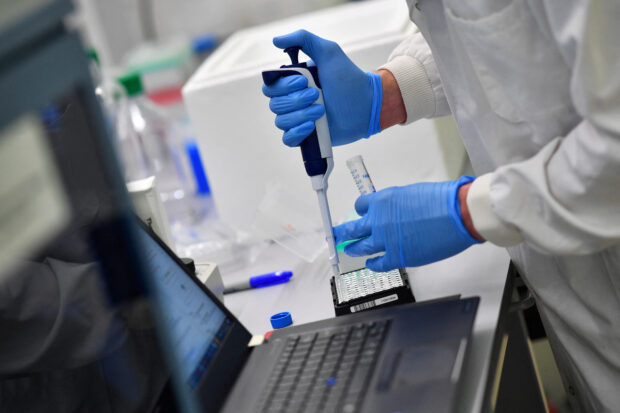COVID and beyond: Labs unite to boost genomic surveillance globally

Scientists work at a laboratory to sequence the novel coronavirus (COVID-19) genomes on the Wellcome Sanger Institute’s campus south of Cambridge, Britain, March 12, 2021. REUTERS/Dylan Martinez
CAMBRIDGE, England — Two laboratories in Britain and South Africa, which were at the forefront of tracking new coronavirus variants during the pandemic, have teamed up to keep the focus on genomic surveillance globally as the COVID emergency recedes.
The teams said they were worried governments and funders may pull back from such surveillance despite its potential to better monitor many infectious diseases, from malaria to cholera.
“One of the big benefits that came from the pandemic was this huge global investment in infrastructure,” said John Sillitoe, director of the Genomic Surveillance Unit (GSU) at the Wellcome Sanger Institute in Cambridge, one of the two partners.
In genomic surveillance, scientists first get data about the genetic material of a virus or organism in a process called sequencing. Then, they analyze the data from several samples to look for similarities and differences, for example, to track how the virus changes or spreads.
READ: WHO: COVID-19 no longer global health emergency
The process has been around for decades but came to the forefront as scientists and public health teams tracked the fast-changing coronavirus.
But Sillitoe said he feared assets needed for the process – like sequencing machines bought in the pandemic – were now “sitting idle” in some countries, which would be a missed opportunity.
“We have a lot of blind spots, both on pathogens and on regions,” said Tulio de Oliveira, director of the Centre for Epidemic Response and Innovation at Stellenbosch University, the other lab in the partnership. During COVID, his team confirmed the discovery of the Beta and Omicron variants.
READ: WHO, advisors urge China to release all COVID-related data after new research
De Oliveira, who will also join the GSU as a deputy director, said the potential for other diseases was huge.
For example, work by the two labs and a global climate-related disease consortium has doubled the number of sequences available for dengue, chikungunya, and malaria-carrying mosquitoes in just the last year, he said.
The laboratories will work together to share resources and support partners in disease surveillance globally with expertise and materials alongside wider World Health Organization-led efforts, de Oliveira and Sillitoe said.
For more news about the novel coronavirus click here.
What you need to know about Coronavirus.
For more information on COVID-19, call the DOH Hotline: (02) 86517800 local 1149/1150.
The Inquirer Foundation supports our healthcare frontliners and is still accepting cash donations to be deposited at Banco de Oro (BDO) current account #007960018860 or donate through PayMaya using this link.